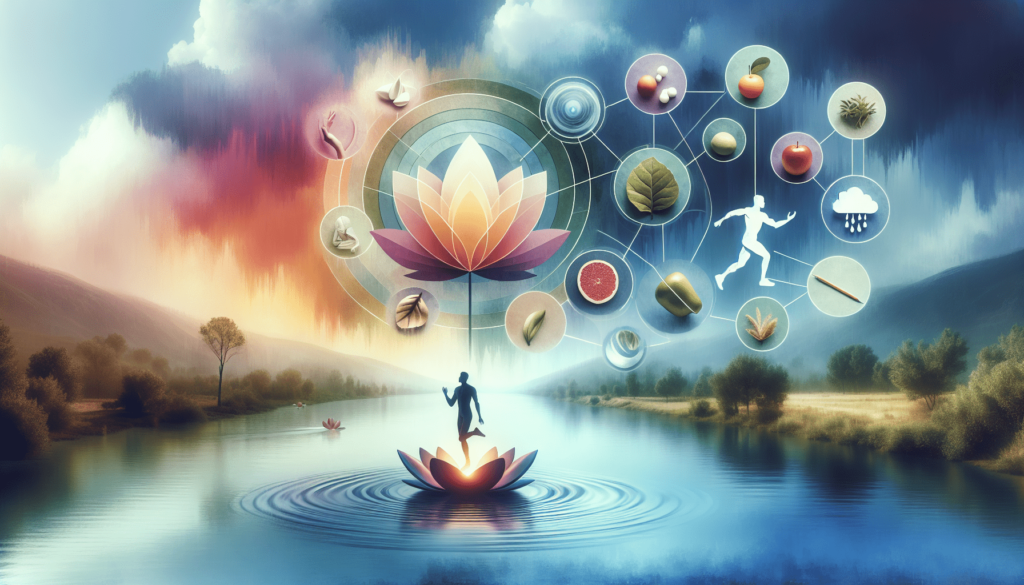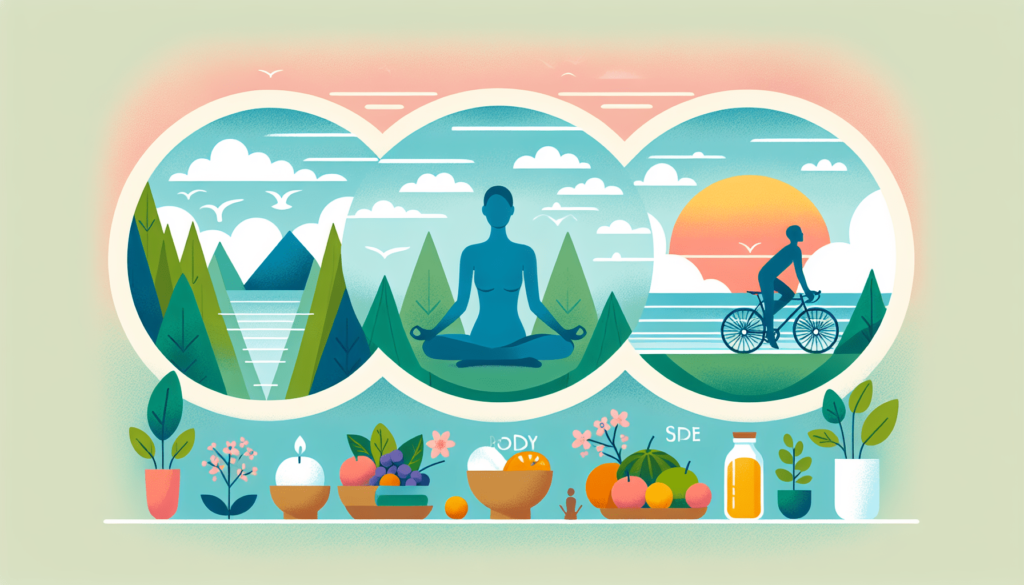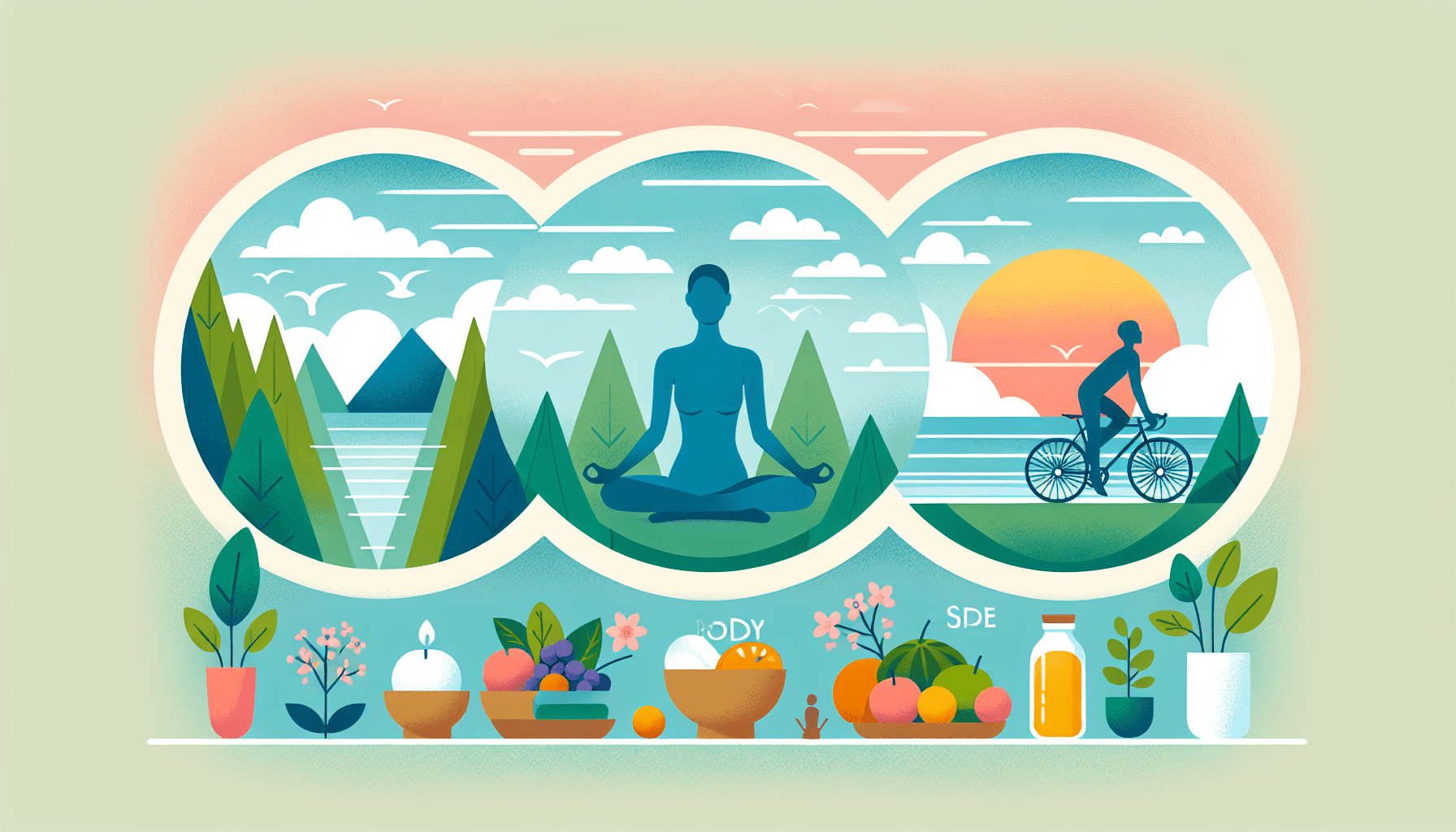Living with anxiety can be overwhelming and challenging, but there is hope. In this article, you will discover a holistic approach that can help you conquer anxiety and regain control of your life. By addressing both the physical and emotional aspects, you will learn practical techniques and strategies that empower you to reduce anxiety, improve your overall well-being, and live a more balanced and fulfilling life. Say goodbye to constant worry and hello to a brighter, calmer future.

Understanding Anxiety
Definition of anxiety
Anxiety is a natural and normal reaction that everyone experiences at some point in their lives. It is a feeling of worry, fear, or unease about an upcoming event or uncertain outcome. While it is common to feel anxious in certain situations, such as before a big presentation or an important exam, anxiety becomes a concern when it is persistent, excessive, and interferes with daily life.
Causes of anxiety
There isn’t a single cause for anxiety, as it is often a complex interplay of various factors. Some common causes include biological factors, such as genetics or imbalances in brain chemistry, environmental factors like stress or trauma, and psychological factors, such as negative thought patterns or low self-esteem. It’s important to remember that each individual may have their own unique set of causes for their anxiety.
Types of anxiety disorders
Anxiety disorders are a group of mental health conditions characterized by excessive and uncontrollable anxiety. Some common types of anxiety disorders include generalized anxiety disorder (GAD), panic disorder, social anxiety disorder, and specific phobias. Each type has its own distinct symptoms and triggers, but they all share the common feature of causing significant distress and impairment in daily functioning.
Effects of anxiety on mental and physical health
Anxiety can have a profound impact on both mental and physical health. Mentally, it can lead to constant worry, restlessness, irritability, difficulty concentrating, and insomnia. It can also exacerbate or coexist with other mental health conditions, such as depression or substance abuse. Physically, anxiety can manifest as muscle tension, headaches, fatigue, rapid heartbeat, sweating, and even gastrointestinal issues. If left untreated, chronic anxiety can significantly impair overall well-being and quality of life.
Traditional Therapies for Anxiety
Cognitive Behavioral Therapy (CBT)
Cognitive Behavioral Therapy (CBT) is a widely recognized and effective therapeutic approach for treating anxiety disorders. It focuses on identifying and changing negative thoughts, beliefs, and behaviors that contribute to anxiety. Through structured sessions with a trained therapist, CBT helps individuals develop coping strategies, challenge irrational thoughts, and gradually face their fears through exposure exercises.
Medication for anxiety
In some cases, medication may be prescribed to manage symptoms of anxiety. Commonly prescribed medications for anxiety include selective serotonin reuptake inhibitors (SSRIs), serotonin-norepinephrine reuptake inhibitors (SNRIs), and benzodiazepines. These medications work by altering brain chemistry and can help alleviate symptoms. However, medication should always be used in conjunction with therapy and under the guidance of a healthcare professional, as they may have side effects and can be habit-forming.
Exposure therapy
Exposure therapy is a specific type of cognitive behavioral therapy that focuses on gradually exposing individuals to anxiety-provoking situations or triggers in a controlled environment. By repeatedly facing and experiencing their fears, individuals can learn to reframe their thoughts and emotions, reducing their anxiety responses over time. Exposure therapy has shown to be particularly effective for phobias, panic disorder, and post-traumatic stress disorder (PTSD).
Limitations of Traditional Approaches
Reliance on medication
One limitation of traditional approaches is the reliance on medication as the primary form of treatment. While medication can be effective in managing symptoms, it does not address the underlying causes of anxiety. Additionally, some individuals may experience undesirable side effects or dependency on medication, which may not be a long-term solution.
Limited focus on underlying causes
Another limitation is that traditional therapies often focus solely on managing symptoms rather than delving into the root causes of anxiety. By only addressing surface-level distress, individuals may miss opportunities to explore and understand the underlying triggers and patterns that contribute to their anxiety. This can result in a temporary relief of symptoms without addressing the underlying issues.
Possible side effects
Medication used to treat anxiety disorders can have side effects that vary from person to person. These can include drowsiness, dizziness, nausea, dry mouth, and sexual dysfunction. Additionally, some individuals may find it challenging to find the right medication or dosage that effectively manages their symptoms without causing undesirable side effects.

The Holistic Approach
Definition of a holistic approach
A holistic approach to overcoming anxiety focuses on addressing the whole person, rather than just the symptoms. It recognizes that anxiety is not solely a mental health issue but a complex interplay of physical, emotional, and spiritual factors. Holistic healing aims to restore balance and harmony within the individual, allowing for a comprehensive and personalized approach to anxiety management.
Addressing mind, body, and spirit
A holistic approach recognizes the interconnectedness of the mind, body, and spirit and seeks to address each of these aspects in the healing process. It acknowledges that mental and emotional well-being are influenced by physical health and vice versa. By using a multi-dimensional approach, individuals can explore and address the various aspects of their lives that contribute to their anxiety.
Importance of a holistic mindset
Developing a holistic mindset involves adopting a proactive and self-empowering approach to managing anxiety. It encourages individuals to take an active role in their own healing by integrating various techniques and practices into their daily lives. With a holistic mindset, individuals can cultivate a sense of self-awareness, resilience, and empowerment as they navigate their anxiety journey.
Mind-Body Techniques
Mindfulness and meditation
Mindfulness and meditation are powerful techniques for reducing anxiety and promoting overall well-being. Mindfulness involves paying attention to the present moment, without judgment or attachment to thoughts or emotions. This practice can help individuals become more aware of their anxiety triggers and learn to respond to them with increased calmness and clarity. Meditation, on the other hand, involves focusing attention on a particular object or mantra to cultivate a sense of inner calm and relaxation.
Deep breathing exercises
Deep breathing exercises are a simple yet effective tool for managing anxiety symptoms in the moment. By focusing on slow, deep breaths, individuals can activate the body’s relaxation response, counteracting the physiological stress response associated with anxiety. Deep breathing exercises can be done anywhere, at any time, making them a convenient and accessible technique for immediate relief.
Yoga and tai chi
Both yoga and tai chi are holistic practices that combine physical movement with breath control and mindfulness. These ancient practices promote bodily strength, flexibility, and balance while also calming the mind. By incorporating regular yoga or tai chi into their routine, individuals can reduce anxiety, improve body awareness, and promote a sense of inner peace and relaxation.
Progressive muscle relaxation
Progressive muscle relaxation is a technique that involves systematically tensing and relaxing different muscle groups in the body. By tensing the muscles and then releasing the tension, individuals can promote deep relaxation and release physical tension associated with anxiety. This technique can be done alone or with the guidance of a therapist or through audio recordings.
Alternative Therapies
Acupuncture
Acupuncture is an ancient Chinese practice that involves inserting thin needles at specific points on the body to promote balance and flow of energy. Research suggests that acupuncture can help reduce anxiety, possibly by affecting the release of neurotransmitters and modulating the autonomic nervous system. Acupuncture can be a valuable complementary therapy for individuals seeking alternative approaches to managing their anxiety.
Herbal remedies
Herbal remedies have been used for centuries to promote relaxation and reduce anxiety symptoms. Some commonly used herbs for anxiety include chamomile, lavender, passionflower, and valerian root. It’s important to note that herbal remedies should be used with caution and under the guidance of a healthcare professional, as they can interact with medications and may not be suitable for everyone.
Aromatherapy
Aromatherapy involves the use of essential oils from plants to promote physical and emotional well-being. Essential oils, such as lavender, bergamot, and chamomile, have calming and soothing properties that can help reduce anxiety. Inhalation or diluted topical application of essential oils can be used as a complementary therapy in conjunction with other anxiety management techniques.
Massage therapy
Massage therapy is a holistic practice that involves manual manipulation of soft tissues to promote relaxation and relieve muscle tension. Regular massage therapy sessions can not only reduce physical symptoms of anxiety, such as muscle tension and headaches, but also enhance overall well-being. Massage therapy provides a nurturing and safe environment for individuals to release physical and emotional tension, promoting a sense of calmness and relaxation.
Lifestyle Changes
Healthy diet and nutrition
Making conscious changes to your diet and nutrition can have a significant impact on anxiety management. Consuming a well-balanced diet that includes whole grains, lean proteins, fruits, vegetables, and healthy fats can provide the necessary nutrients for optimal brain and body function. Additionally, reducing caffeine, alcohol, and processed foods can help regulate mood and minimize anxiety triggers.
Regular exercise
Regular physical exercise is an excellent way to reduce anxiety and improve overall mental and physical health. Exercise releases endorphins, which are natural mood boosters, and helps reduce stress and tension. Engaging in activities such as walking, running, cycling, or yoga can provide a healthy outlet for anxious energy and promote a sense of calmness and well-being.
Sufficient sleep and rest
Adequate sleep and rest are vital for maintaining mental and physical well-being. Sleep deprivation can exacerbate anxiety symptoms, making it essential to prioritize quality sleep. Establishing a bedtime routine, creating a comfortable sleep environment, and practicing relaxation techniques before bed can promote better sleep hygiene and improve overall anxiety management.
Reducing stress factors
Identifying and reducing stress factors in your life is crucial for managing anxiety. While it may not always be possible to eliminate all sources of stress, creating healthy boundaries, practicing time management, and engaging in stress-reducing activities can help minimize the impact of stress on your overall well-being. Taking breaks, pursuing hobbies, or engaging in activities that bring joy can provide an essential counterbalance to daily stressors.
Social Support and Relationships
The role of social support
Social support plays a significant role in managing anxiety. Having a strong support network of friends, family, or support groups can provide a sense of belonging and understanding. Sharing experiences and feelings with trusted individuals can alleviate anxiety and foster a sense of connection. Feeling supported and validated can make a significant difference in one’s anxiety journey.
Building a strong support network
Building a strong support network involves actively seeking out and cultivating positive relationships that provide emotional support and understanding. It may involve joining support groups, reaching out to like-minded individuals, or reconnecting with old friends. Having a diverse range of supportive relationships can provide different perspectives and sources of comfort during challenging times.
Support groups and therapy
Support groups and therapy can be invaluable resources for individuals dealing with anxiety. Support groups offer a safe space to share experiences, learn from others, and gain practical coping strategies. Therapy, whether individual or group, allows for deeper exploration of underlying causes of anxiety and provides a structured and supportive environment for personal growth. Both support groups and therapy can complement and enhance other aspects of a holistic approach to anxiety management.
Self-Care and Stress Management
Taking time for oneself
Self-care is an essential component of a holistic approach to anxiety management. Taking time for oneself involves prioritizing activities and practices that promote relaxation, pleasure, and well-being. This may include engaging in hobbies, pampering oneself, or simply taking quiet moments for reflection and introspection. By consciously carving out time for self-care, individuals can replenish their energy and better cope with anxiety.
Setting boundaries
Setting boundaries is crucial for managing anxiety and maintaining emotional well-being. This involves establishing limits and clearly communicating them to others, whether it be in personal or professional relationships. Setting boundaries can help reduce stress, prevent overwhelm, and promote a sense of control in one’s life. It is empowering to recognize and assert one’s needs, and it can greatly contribute to anxiety management.
Practicing relaxation techniques
Incorporating relaxation techniques into daily life can help reduce anxiety and promote overall well-being. Techniques such as deep breathing exercises, mindfulness, meditation, and progressive muscle relaxation can be practiced regularly to activate the body’s relaxation response. By implementing these techniques during moments of stress or anxiety, individuals can regain a sense of calm and peace.
Engaging in hobbies and activities
Engaging in hobbies and activities that bring joy and fulfillment can be transformative in anxiety management. Pursuing activities you are passionate about can provide a healthy outlet for stress and anxiety and create a sense of accomplishment and self-worth. Whether it’s painting, gardening, playing an instrument, or engaging in sports, these activities can promote relaxation, boost mood, and distract from anxious thoughts.
Professional Help in a Holistic Approach
Finding the right therapist
In a holistic approach to anxiety management, finding the right therapist is essential. Look for therapists who have experience and training in both traditional and alternative therapies. A good therapist will take a holistic view of your anxiety, addressing mind, body, and spirit, and work collaboratively with you to design a personalized treatment plan. Don’t be afraid to ask questions and find someone who you feel comfortable opening up to.
Integrative therapy approaches
Integrative therapy approaches combine both traditional and alternative therapies to provide a comprehensive and tailored treatment plan. By integrating various techniques and modalities, such as cognitive behavioral therapy, mindfulness, yoga, and acupuncture, individuals can address the multiple dimensions of their anxiety. Integrative therapy allows for a holistic and flexible approach that can be adapted to individuals’ unique needs and preferences.
Combining traditional and alternative therapies
Combining traditional and alternative therapies can provide a well-rounded and effective approach to anxiety management. Traditional therapies, such as cognitive behavioral therapy and medication, can provide structure and symptom relief, while alternative therapies, like acupuncture and aromatherapy, can address underlying imbalances and promote overall well-being. Applying a combination of approaches allows for a comprehensive and individualized treatment plan that considers all aspects of the individual’s well-being.
In conclusion, a holistic approach to overcoming anxiety recognizes that true healing involves addressing the mind, body, and spirit. By integrating traditional therapies, alternative therapies, and making lifestyle changes, individuals can cultivate a balanced and empowered approach to anxiety management. With the right support, self-care practices, and professional guidance, overcoming anxiety holistically is possible, leading to improved well-being and a more fulfilling life.

